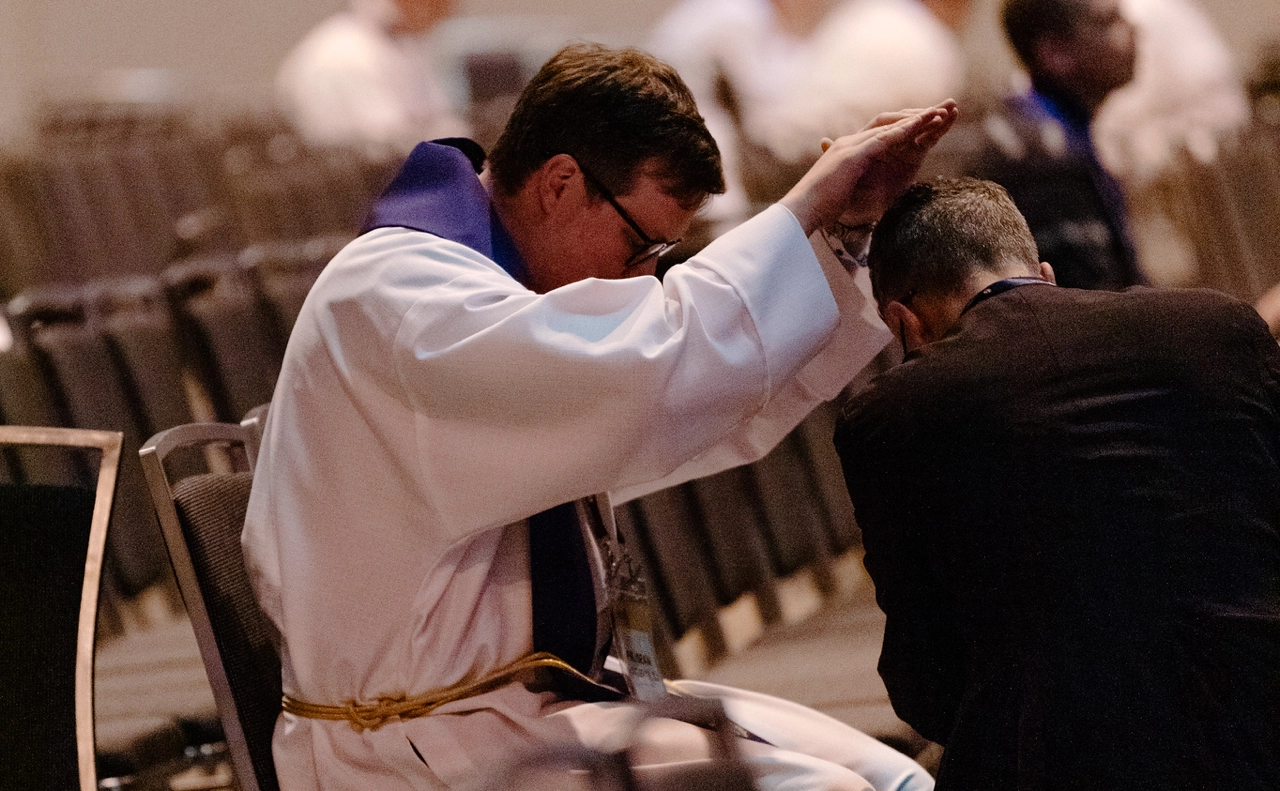The Dominican Art of Conversation
It’s 2am, I’m with my friends, I’m cracking open another cheap beer, and we’re arguing about the goodness of God… or pondering the limits of patriotism… or digging into the foundations of ethics… or debating the merits of nuclear power… or laughing at each other’s stupid stories. This is how I remember my undergraduate years. It was a time of conversations. A time for conversation.

We were busy, certainly, but we could nevertheless spend hours each day in relaxed, aimless conversation. It wasn’t all late-night and beer-fueled conversations either. There were conversations before and after lectures, conversations on the long walk to the chemistry department, conversations in the local kebab shop, conversations over lunch after Mass in the Catholic chaplaincy, and, for the two glorious June weeks after exams, there were long and languid conversations lying back in the grass by the River Cam.
It was a golden time, and a time, I realise now, in which I was learning to listen and to speak well. Some of these conversations were frivolous and quickly forgotten, but many were moments of genuine encounter and transformation. I recall one delightful conversation about the Psalms with a non-Christian friend, sparked by a documentary we were watching in the TV room. Another memorable conversation took place on a foggy night in my first term, walking home from a party with a Christian friend. Somehow I mentioned St John of the Cross, and she suddenly began to gush about how much his poetry meant to her, and we shared our thoughts on the nature of God and man, walking in the dark, two teenagers skirting the threshold of eternity.
Dominican Life
A few years after leaving college, I joined the Irish Province of the Dominicans, the Order of Preachers. I felt called to serve God with my words. I was thinking, naturally enough, of words spoken in formal preaching. My life had been transformed by excellent preaching and teaching, and I was ready to give my life to that same mission of proclamation. What I’ve come to realise since then, though, is that the Dominican vocation to preach is about much more than just the monologue of proclamation – as important as that is. As a Dominican friar I am called to witness to God in dozens of conversations every day – with a group of young people on the tram, with a homeless woman who’s called to the door, with students in a classroom, and above all with penitents in the confessional.

For a time, I considered some of these conversations to be secondary, even a distraction. The give-and-take of dialogue didn’t always feel as directly evangelical as a sermon in the liturgy. On reflection, it became clear that conversation was often the only possible evangelical approach: there were no pulpits on the tram, and the homeless woman at the door wasn’t a regular at our Masses…
Humbert of Romans: Conversation and the Preacher
It was only when I returned to the early Dominican sources that I came to see conversation as essential to the work of a Dominican friar. There’s a great little work called ‘A Treatise on Preaching’, for example, by the fifth Master of the Order, Humbert of Romans. It’s a little gem, full of insights not solely for Dominican friars, but for any Christian interested in evangelisation. In it, Humbert considers not just the formal act of preaching in the liturgy, but the whole lifestyle of the preacher, including his conversation. There are some preachers who focus all their energy on sermons, he says, but “in their ordinary conversations they never say an edifying word, which is greatly to be deplored”.
Against such preachers Humbert appeals immediately to the example of Jesus: he “was not only edifying when He preached publicly but also when He conversed intimately”. He gives the example of the conversation on the road to Emmaus, and with the Samaritan woman at the well, and in the houses where Jesus received hospitality. Whether at night or by day, whether with his disciples or with his adversaries, the words of Jesus always did good, writes Humbert.
There are very good reasons that a preacher – “and every Christian”, Humbert adds – should value conversation. One of them is the fact that in a private conversation we are usually addressing one person, and so we can, with the help of the Spirit, choose our words for that particular soul in that moment, whereas the members of a liturgical assembly are wildly diverse in their needs. Our words are more likely to penetrate the heart of our interlocutors in a conversation than during a sermon. Humbert uses a vivid image to make this point: “in the same way an arrow shot straight at someone will hit him with greater force than when it is shot haphazardly at many”.

How then should we engage in these conversations? We should consider carefully, Humbert thinks, with whom we are speaking. Not every subject is right for every conversation. Nor should we jabber on too much, “lest we bore our listener”. With some people we should be reserved, and with others we can speak freely. We should be slow, Humbert says, to enter into deep conversation with someone who is intoxicated or simply doesn’t want to listen. We ought to judge carefully the opportunities that arise: “The most favourable time to speak is when we can introduce into our worldly conversations, prudently and simply, some words which will do good and counteract evil”.
Finally, Humbert suggests that we should have a good hoard of stories from which to draw, to make our conversation interesting and memorable. “People find anecdotes more moving than mere words”, he writes in another work. “They are also easier to grasp and make a deeper impression on the memory, and many people find them more enjoyable to listen to”. So, he writes, the preacher should be equipped with stories for “private conversations with all kinds of people, to bring help and salvation to all people”.
Humbert didn’t just recommend the use of stories in evangelical conversation; as Master of the Order he actually commissioned collections of stories for this very purpose. One such collection, by Stephen of Bourbon OP, included over 1300 little stories – brief, vivid anecdotes drawing on mythology, animal lore, contemporary events, chivalric literature, and ghost stories.
St Dominic and His Art
Humbert’s presentation of evangelical conversation is theoretical, but it’s fleshed out magnificently in the life of the founder of the Order of Preachers: Saint Dominic. One pen-portrait, by Blessed Jordan of Saxony, describes Dominic’s interest in conversation:
“No matter where he happened to be, whether on a journey with his companions or in the house of a stranger, or even in the presence of princes, prelates, or other dignitaries, his conversation was always edifying and abounded with stories and anecdotes which would draw his hearers toward love for Christ and away from love of the world. At all times his words and his works proclaimed him a man of the Gospel. During the day, none was more affable, none more pleasant to his brethren or associates.”
“None was more affable”
I love that little phrase: “None was more affable”. Dominic was chatty! At night he would descend into the profundity of personal prayer, and sometimes on the road too he would ask his brothers to walk in silence, but during the day, in the apostolate, he was talkative and engaging.
In Rome, we’re told, Dominic would go around the outskirts of the city to visit the shut-ins, to chat with them. In Bologna, a university town, he would visit student residences to chat with students there. And when he met a young woman named Diana D’andalo, discerning her religious vocation, we’re told he had long conversations with her. Very few stories come down to us, in fact, of St Dominic’s formal preaching, but we hear a lot about him in conversational mode, poised to strike with the well-directed arrow of the Word.
The most famous of all his conversations is, of course, the one that took place with an innkeeper in Toulouse, long before the Order was founded. Dominic discovered that his innkeeper was an Albigensian heretic. Blessed Jordan tells us that Dominic spent the entire night “fervently exhorting and zealously arguing with” the heretical innkeeper, who, “no longer able to resist the wisdom and the spirit that spoke, returned by God’s grace to the true faith”. This is Dominic in attack mode, but consider this: the innkeeper could very easily have left the conversation at any point. Dominic’s discourse – and Dominic himself – must have been attractive, charming, and respectful in order to keep that innkeeper up all night. It wasn’t a tongue-lashing; it was a conversation.

A Time for Training
What I’ve come to appreciate in studying the early Dominican sources is that conversation is anything but incidental to the spread of the Gospel. Proclamation is essential, and the formality of the liturgical sermon is beneficial, but the humble, quiet work of conversation is the means by which the Gospel reaches many hearts.
All this means that your college years are an especially privileged time for practising this evangelical art. In the coffee shop, at the gym, in the chemistry lab, at parties, in your Bible studies, on the bus: wherever you find yourself with people, you are presented with opportunities for conversation. This prospect might scare you, and you might be inclined to minimise verbal interactions, to pop your earphones in and to retreat from dialogue. That’s an understandable response, especially for young Catholics on secular campuses. But I promise you this: if you use this precious time to listen well, to pay attention to people, to tell stories, to argue well, to speak with charm, and to seek to give life with every word you speak, you will be gaining a lifelong skill that is powerful in the service of the Kingdom.
